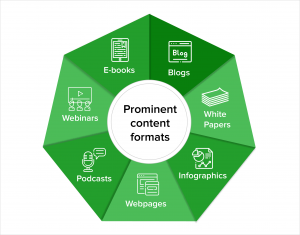Best Modern Marketing Strategies for business success
The change in technology and social trends impact customer expectations. A successful marketing strategy is one that combines both – “trends & technology” to connect with consumers and guide purchase decisions.

Hence, marketing strategies shouldn’t remain static. They should evolve with time to make a greater impact. Modern marketing tools provide the right platform & infrastructure to launch a successful strategy, analyze progress, and streamline the entire process.
The following nine modern marketing strategies for business success have proved their potency and are shaping consumer expectations in the modern world.
Social Media Marketing
According to a study by Oberlo, about 3.5 billion people have access to social media, this is about half of the world’s population.
The same study also pointed out that 71% of customers who had a positive experience with a brand on social media recommend the brand to friends & family. Integrating a social media plan into the company’s marketing strategy makes a lot of sense.
Read Also:
- How Marketing Strategies Take Your Business Forward
- 8 Digital Marketing Tips for Startups
- How Digital Marketing Services Can Accelerate Your Business
Portals like Facebook, Instagram, Youtube, TikTok, etc give people the power to build personal brands. The rise of influencers has created a new branch of Social media marketing.
Influencer marketing is ideal for brands that are new to the market, influencers already possess the platform & audience. With the help of social media influencers, reaching potential customers becomes easy and with a high probability of conversion.
As per Mediakix, 89% of marketers feel the ROI from influencer marketing is 11x more than other methods.
Companies in the beauty & fashion industry have scaled their operations and customer base with Instagram & Youtube influencers. The extraordinary potential of this approach has convinced even B2B agencies to explore influencer marketing.
Email marketing ~ One to one marketing is back
Although there are newer and more visible mediums to market brands. The E-mail marketing has still retained its relevance to generate leads and increase conversions.
Email marketing coupled with automation creates an organized & seamless process of targeting users based on their interests & for the specific stage of the customer journey.
Email marketing is an important strategy for acquiring new customers & retaining existing ones.
The success of an email campaign can be determined by open rate & click-through rate (CTR). These metrics help in identifying areas of improvement.
Smart SEO Strategy
“Search Engine Optimization” or “SEO” is a primary keyword for business success. A focus on tapping online traffic organically through search engines is the premise of SEO.
A smart SEO strategy aligns all business aspects to a holistic strategy with the use of Blogs, website content, website Landing page, application, etc.
People across the globe consult search engines to find things, help with professional and personal problems, decide places to hang out, things to eat, etc.
A good SEO plan can help in targeting the exact user base and get natural exposure through Google, Bing, Yahoo, and other prominent search engines. This is also the most successful way to get potential leads.
While there are many ways to optimize a business for search engines, there isn’t a single approach that works for every industry. SEO is a combination of various user-friendly practices that search engines acknowledge and reward with increased visibility.
An effective strategy for SEO (Search Engine Optimization) + ASO (App Store Optimization) can give the brand more reach & potential for tapping new customers.
There are more than 2.7 billion smartphone users in the world. This makes mobile apps an effective way of reaching customers, with the help of a holistic mobile app marketing strategy.
Retention & Retargeting Focus
The power of a long-term customer relationship is undisputed. It isn’t just lucrative but also an important prerequisite for referrals.
According to a popular survey, 65% of a company’s business comes from repeat customers rather than new ones. It is also important to note that retention is a lot cheaper than acquisition.
With retargeting businesses can convert users who left the site/app without making a purchase. These “window shoppers” are a very strong lead.
The retargeting strategy is successful because the customer-base is already familiar with the brand & the approach can be highly customized.
Content Marketing
A highly effective content strategy is relevant across industries. A thorough content marketing strategy prioritizes information about the industry & the product to influence buying decisions.
With fresh & detailed content about the industry, brands can establish themselves as a credible authority.
Focus on specific formats depends on the nature of the product, domain, and understanding of user persona.
With content marketing, brands can-
- Increase visibility & authority
- Make a unique impression on customers
- Guide prospects through a content conversion funnel
Co-Branding
A co-operative marketing strategy where 2 brands come together to sell one product/service.
Using collective credibility, existing customer base, and influence to drive people to a single destination. This type of marketing is very successful for products/services that complement each other.
There are many examples of successful co-branding, some prominent ones include- Go pro & Red Bull, Uber & Spotify, Apple & Mastercard, etc.
Conversational Marketing
Mediums of brand communication have evolved in the past decade and so has marketing. Conversational marketing is “one on one” interaction with consumers. Some mediums of such marketing include-
- Chatbots
- Live chats
- Voice Assistants
- Conversation with AI
This is a fundamentally new concept. The objective is to give the consumers the requested information immediately.
It streamlines engagement and conversion with relative ease. It also makes interaction with the brand more fun, friendly, and informative.
Ethical branding ~ Stand for something
Trust is a strong factor for purchase. According to Smart Insights, only a third (about 34%) consumers trust the brand they are using.
This statistic implies that most customers have a general distrust of organizations. Brands are failing to make a stand for things that matter to their consumers. In an ecosystem where retention & re-targeting current customers hold a lot of value, building trust should be an absolute priority for brands. Even more relevant in a post-pandemic world.
Companies that invest in social welfare, in its employees, and support relevant causes build a strong bond with its customers.
Earned Media
This is another organic marketing practice, also called free media. It is created by providing value to customers. Earned media can be in the form of a social media testimonial, a news article reference, word of mouth, customer review, etc.
Earned media is very powerful in influencing new customers. People heavily rely on reviews & testimonials before purchasing. In fact, more than 90% of customers trust earned media.
Conclusion
Each marketing strategy has great potential for success. Choosing the right strategy is all about understanding the user persona and reaching the target audience at their preferred place.
The most important part of marketing is keeping a track of ROI and weeding out practices that aren’t working. Modern strategies have an incredible scope of creativity and engagement. Brands that speak the customer’s language have a high engagement, increased level of brand loyalty and sales.

